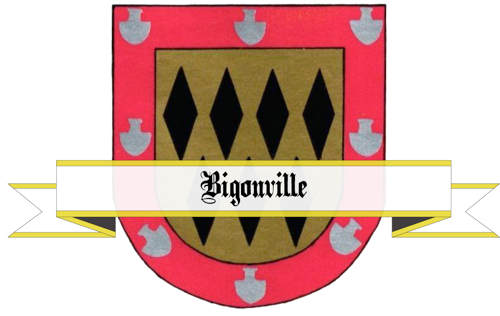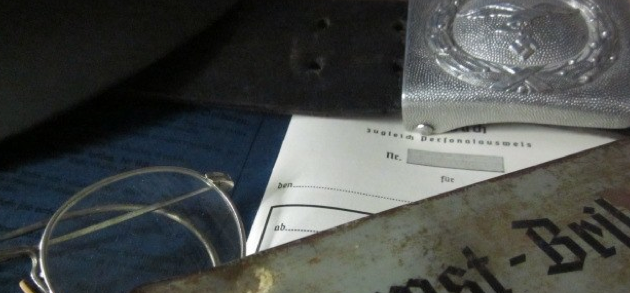MILK
A Christmas Story
MILK is taken from a collection of stories entitled JOURNEYS which is to appear in spring 1995. In MILK I wish to remember Christmas 1944 and the 19,256 dead and 82,305 wounded German and Allied soldiers who were the casualties of the two-week-long Ardennes Offensive, also known as the Battle of Bulge. Today they are largely forgotten - remembered only by those who lay wreaths on their graves or who pay the pensions to the survivors. I was spared. I wish to tell that story.
Twice my life has been saved by milk, and both times it was American milk.
When in the summer of 1925 I had drunk up all my mother's milk and was still hungry, they gave me to an neighbour to be breast-fed. Her little Ewald had gone off her milk and, because in those days nothing that came free of charge was allowed to go to waste, I had to drink up all of her milk too. So then they put me onto cow's milk, which I couldn't stomach, and I fell ill. Finally, after all efforts by parents and doctor to save me had failed, and the candles had been lit in preparation for my heavenward journey, a Moroccan soldier who was billeted with us at the time suggested tinned American milk. Old Alof was dispatched immediately to nearby Koblenz, where in fact he managed to track down the milk. He pedalled back at lightning speed, arriving in the nick of time. Mama fed me the milk and, lo and behold, it agreed with me and I got better. Probably because even in those days it was pretty sweet. Soldiers of occupation are never popular in the countries they occupy. That is true for every single army in the world, but sometimes they save lives too.
One day in 1944, after we had fought American soldiers in the woods above Vianden, I came across the body of a young American and gathered his things together so I could hand them in. In his bag I found a letter from his mother. She prayed that her Jimmy would return alive; his brother had just been killed in Japanese waters. "Don't forget that I myself saved your life from the beginning", she wrote. What did she mean by "saved"? Presumably she had breast-fed her son, too.
My war came to an end on Christmas Eve 1944 in a small village on the border between Luxembourg and Belgium. A tank battle had been raging throughout the morning on this particular December 24th. When it was all over towards midday, almost all the farms around were ablaze. The civilians had fled before the approaching onslaught and, the returning Germans. The previous evening four of us had installed ourselves in one of the abandoned houses. Our ammunition had run out and we were now waiting for nightfall to try to slip behind American lines, the Americans having meanwhile surrounded the area with their tanks and infantry. On the living room table there was a wreath set up by the family for their allied friends, and packets of Camels and Chesterfields were still on the mantlepiece. The farmer had recently slaughtered a pig and there was a hot meal of boiled pork and sausage-meat soup all ready and prepared, which we found in a large pan in the kitchen. At midnight we had fried cutlets - they were to be our last delicacy for a long time.
The end came for us on the following day in the cellar of this house. We were sitting huddled under quilts, for want of anything else, which we had found in the house, and were awaiting the outcome, surrounded by potatoes. Suddenly we heard the sound of hobnail boots upstairs. I peeped from under the quilt and caught sight of American paratrooper's boots, familiar from past combat with our brothers from the opposite side. Everything that followed happened in a flash. Two hand grenades exploded in the cellar. The quilts took the fragments. I thought the time had come now to surrender, so I ran to the cellar stairs, yelled "Stop firing" and looked straight down the barrels of American rifles. "Hands up" came the terse answer from above, and so with our hands above our heads the four of us went up the stairs one after the other. It was a frightening moment. But they didn't shoot. At 1.10 p. m. I looked at my watch for the last time. We were only allowed to keep the clothes we were in. Photographs, letters and service record books lay in shreds on the floor, everything else scattered around the room. If we were too slow the soldiers helped us along with blows from their riffle butts. Then four of them led us to a street nearby. The place looked like any other where war has been: people dead and wounded, houses destroyed, vehicles and tanks on fire. First-aid attendants and an army chaplain were moving around the scene offering what help they could - both sides, as I observed. Dead animals lay on the road; pigs, cattle, calves, burned with phosphorus, were writhing on the ground.
When we reached a crossroads we were split into two groups. Our two guards conversed in Polish as they led us down a short street and then into the courtyard of a building. It was only when they ordered us onto the manure heap in the pig sty with our faces to the wall that, in spite of their poor English and ours, we understood what they planned to do. We had survived every infernal moment of this war, had lost our freedom at the end but remained alive, only now to be closer to death than ever before. We weren't able to see what they were doing but we could hear what was going on. It seemed they couldn't reach an agreement, one was for, the other appeared to waver. With our faces still to the wall we just couldn't tell for sure. The one thing we knew only too well was the sound of a rifle being reloaded. And when we, thought we heard that sound, perhaps we even considered for a split second whether American rifles were fired differently from ours.
It is here on the manure heap in Bigonville that my buried memories of the war become vividly alive again. Every detail, every sound, the burned pigs running around, the grey wall in front of me, the stench, all this has come flooding back to me every Christmas Eve since. It has been so for fifty years now, and I expect it will always be so.
Suddenly we heard voices in the yard. A strong American voice called out "What are you doing there?" We were told to turn round and get off the manure heap. Such an order could not be disobeyed, and our two guards also leapt aside, setting us free. We saw before us an officer, pistol in one hand and a hand grenade in the other. He ordered us and the two guards to march ahead of him. He didn't trust them an inch and kept a close watch on both us and them. At the crossroads he left my companion and the two guards with a large group of prisoners and soldiers and carried on just with me. He stopped in front of a badly damaged house and ordered me down into the cellar. Lying on a blanket was a child, its mother beside it. The young woman told me her story in a few words. Fleeing from the war zone she had taken shelter here. During the shooting she went into labour prematurely and so, sooner than she would have wished, and in such circumstances as she found herself, she gave birth to her child all alone in the night. The baby girl was crying incessantly. This no doubt is what alerted the first lieutenant to them as he passed by, and this must have been why he was on the lookout for someone to whom he could explain in English what he wanted: milk for the baby. With my schoolboy English I at least understood the word "milk", but I was still at a loss what to do. Where was I to find milk? The young mother was squeezing her breasts, but to no avail. The hellish experience she had been through had literally stopped the flow. Not a drop, not even when two of us and then the three of us helped to squeeze. In the meantime the officer had rehooked the grenade to his belt. At the end of our combined efforts the pistol lay to one side.
Suddenly I heard the bellowing of a cow. I grabbed a bucket which was to hand and raced upstairs. The officer followed. We crossed the street and eventually I found the cowshed from where the noise came. Standing inside was a magnificent black and white cow. She was still tethered but unharmed; it was just that, because of the shooting, she had been stuck in the shed for two days without being milked. Her udder was full to the brim. I took a milking-stool and the bucket and steeled myself. I never forget those first drops of milk. One summer holiday I had tried my hand at milking the neighbour's cow, but this was my professional debut, so to speak. And I found it wasn't that difficult. Sometimes, when you're between the devil and the deep blue sea, the Lord still provides.
Back in the cellar the two of us scalded the milk and I unearthed an old dirty milk bottle. The man, who only this morning had been my enemy, looked on, as I did, at this "Ceremony of Milk". And the baby just did what hungry babies do. She drank up what she was given. Totally indifferent to everything around her.
What became of the two of them I was never able to ascertain subsequently. For obvious reasons, the mayor was unable to find any record of a baby girl being born on either the 23rd or 24th December in his register. I have heard no more of the woman. None of the villagers were able to help me in my search. They only returned to their ruined houses a week later. Perhaps she perished in the chaos of war, alone or with her baby. Who knows? Two years ago I managed to locate that cellar again. It was considerably altered, the house having been reconstructed, but still recognizable. There was a restaurant over it now. This time we had fish. I decided not to order the milkshake on the menu.
The lieutenant led me back to the crossroads. What became of him I've also failed to discover in all these 48 years. The war continued in those parts for a few weeks more. Last year I received a letter from an American who was planning to add a book to the long list that has been written about the Battle of Bulge. He asked me if I would contribute an article. But I didn't want to stir up old memories, and my amazing story was too precious for me to just hand over like that.
I spent that night in neighbouring Arlon in a dog enclosure. It was cold and whenever I tried to lie down the guards made me sit up again. And so I was forced, all 6 foot of me, to remain bent double until morning. The dogs in the next cage started yapping when towards midnight the Christmas bells began to chime for the townspeople - and for their unwilling guests, or whatever we were given the unusual circumstances. And the many of us who had pulled through yet again sang the words of Silent Night, Holy Night.
No Christmas since then has moved me.
Source: Copyright © by Josef Schröder
